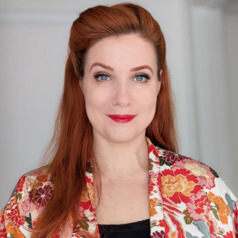|
It was 1989 and University of Melbourne chemistry professor Richard Robson was preparing models of molecules for his class when an idea struck him about their structure.
Decades on, he’s just been announced Australia’s 12th Nobel science prize winner for the discovery of metal-organic frameworks, which can capture massive volumes of gases and other chemicals. This means they can trap greenhouse gases with incredible efficiency, to name just one example.
Robson’s colleague and collaborator Deanna D’Alessandro writes that he didn’t start out trying to invent a revolutionary new material. His research was driven by deep curiosity – as with all fundamental science, it started out by asking questions about our natural world.
It’s not always obvious where such curiosity might lead, meaning this type of research is underappreciated and underfunded. But this prize is an important reminder that this kind of basic science lays the foundation for world-changing discoveries.
|

|
Signe Dean
Science + Technology Editor
|
|

Deanna D'Alessandro, University of Sydney
Richard Robson was struck by an idea in 1989. Decades later, his story shows the importance of fundamental science.
|

Scott Lucas, University College Dublin
Middle East expert Scott Lucas addresses the key issues of the Gaza ceasefire deal.
|

Kristin R. Laurens, Queensland University of Technology; Lauren M. Piltz, Queensland University of Technology; Linda J. Graham, Queensland University of Technology
Suspending or expelling a student should be a last resort. But our study shows it is more common than it should be in NSW public schools.
|

Michael Toole, Burnet Institute
By August,15.8% of children aged under five were suffering from acute malnutrition.
|

Cassandra Burke Robertson, Case Western Reserve University
The former FBI director’s indictment breaks a principle that has protected American democracy for 50 years.
|

Michelle Grattan, University of Canberra
A little under a year ago, Michelle Rowland, who was then communications minister, had to make a humiliating retreat, she now might just have to make another.
|

Derek Wilding, University of Technology Sydney
With news of a proposed merger between Seven West and Southern Cross, media laws are back in the spotlight, and so too are the glaring holes in the regulations.
|

Carl Rhodes, University of Technology Sydney
Former prime minister Bob Hawke regretted saying: ‘By 1990, no Australian child will be living in poverty’. But his broken promise still had a surprising impact.
|

Zena Assaad, Australian National University
AI weapons present many challenges – but these ultimately stem from people.
|
Politics + Society
|
-
Carolyn Holbrook, Deakin University; Thomas Kehoe
Australian sports survived tobacco ad restrictions from the late 1960s – they shouldn’t fear a gambling crackdown now.
-
Adrian Beaumont, The University of Melbourne
The President’s polling results haven’t changed much since the government came to a standstill. Here’s why the shutdown came about and how it’s progressing.
|
|
Health + Medicine
|
-
Iana Wong, University of Sydney; Tom Denson, UNSW Sydney
The way someone forms emotional bonds with their caregivers as a child can increase the risk they’ll be violent to a partner later in life. But other factors play an important role.
-
Thea van de Mortel, Griffith University
An infection control expert explains why sharing your razor, towel or toothbrush isn’t such a great idea.
|
|
Business + Economy
|
-
Peter Edwell, Macquarie University
More than 2,000 years ago, the depiction of living leaders on Roman coins caused similar ructions. It came at a time when the Roman republic was in trouble.
|
|
Environment + Energy
|
-
Barry Barton, University of Waikato
The government’s energy package is unnecessarily preoccupied with fossil fuels and ignores important reform work already underway.
|
|
Arts + Culture
|
-
Roger Dawkins, Western Sydney University
Kiah Roache-Turner’s new film is a unique blend of war thriller and shark survival gore. And while it could have been thematically deeper, it still packs a punch.
|
|
Books + Ideas
|
-
Ben Etherington, Western Sydney University
At his peak in the early 1890s, Peter Jackson was easily the most famous living Australian in the world. But he was more than boxer.
|
|
|
|
|
This way to the exit
"Anyone who reads your article on the National Anti-Corruption Commission and a range of similar articles in the mainstream press over the last two or three years would know that the only course for Commissioner Paul Brereton right now is the one towards the door marked EXIT. And that door must not dispense golden handshakes on the way out."
Maggie Woodhead, Ballajura, WA
Drinking harms
"The impact alcohol use has on families, especially women and children, is significant. The article used the term 'drinking heavily' but drinking a small amount of alcohol can change a person’s mood. I’ve seen some people turn nasty after one or two drinks. This may be the small end of distress that gets overlooked. Governments make huge amounts of money from legal drugs such as alcohol and tobacco. Time for more government-funded proactive education."
Amanda Olle 
Childcare swaps
"Showing my age, but back in our day, we organised childcare swaps. Two or three mothers working part-time on different days, and caring for each other's children on our days at home. It was often easier to 'referee' a couple of kids than to entertain one, and it’s great for the children’s socialisation."
Beth Rees 
We'd love to hear from you. You can email us with your thoughts on our stories and each day we'll publish an edited selection.
|
| |
|
|
|
The Conversation AU/NZ
Melbourne Victoria, Australia
•
Full Time
|

|
|
|
|
Featured Events, Courses & Podcasts
|
View all
|
|
|
|